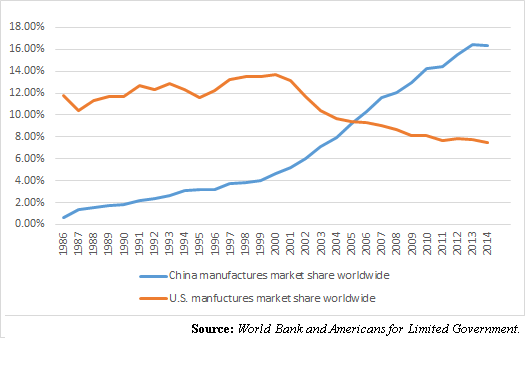AMERICAN COMPETITIVENESS DEPENDS ON IT …
The Environmental Protection Agency (EPA) has helped to strangle U.S. economic growth for the last eight years with its 2009 carbon endangerment finding and subsequent rules against new and existing coal power plants, dubbed the “Clean Power Plan.” But regulatory policy has not just represented significant government overreach, it has also undermined U.S. competitiveness globally.
Now, with the inauguration of President-elect Donald Trump on Jan. 20, the U.S. could be poised to reclaim its mantle as the world’s foremost economic power — by stopping further job-killing regulations from being implemented and rescinding the Obama regulations either under the terms of the Administrative Procedures Act, a process that can take a couple of years, or via Congress’ Article I power of the purse.
As the U.S. House of Representatives Committee on Energy and Commerce noted in July 2016, since President Barack Obama took office the EPA has published just under 4,000 final rules in the Federal Register, which caused significant “Legal, cost, and practical implementation issues; effects of the rules on the electricity and oil and gas sectors; impacts on the affordability and reliability of energy supplies; impacts on American households and consumers; and, impacts on American workers, jobs, and economic growth.”
These regulations have cost the American companies hundreds of billions in compliance costs, and under the Obama administration cost more than $50 billion in annual costs each year. Hill contributor Jason Pye explained in Dec. 2016, the Clean Power Plan alone is estimated to cost the energy sector between $41 billion and $73 billion simply to comply. This is making electricity more expensive in the U.S., increasing the cost of doing business and killing jobs particularly in the coal sector, with an estimated 126,000 jobs expected to be lost as a direct result to the Clean Power Plan.
Even Democrats know this is a mistake. Resource-rich states such as North Dakota have consistently urged for looser EPA regulations in order to remain economically efficient. In Aug. 2015, Democratic Senator North Dakota Heidi Heitkamp fought increased regulations of greenhouse gas emission standards under the Clean Power Plan. Heitkamp complained to the administration that, “The Administration claims to support an all-of-the-above energy strategy, but has provided no viable path forward for coal and now seems to be going after natural gas as well — a fact this EPA rule makes resoundingly clear — and that will only hurt consumers, businesses, and our economy.”
Heitkamp explained that coal supports 13,000 jobs in North Dakota, and mining has an economic impact of $3.5 billion. The Democrats’ own EPA regulations are strangling their own states, as well as Americans’ opportunities across the country.
As taxpayers and state governments seem to bear the brunt of these overreaching regulatory policies, the national economic problems these regulations have caused is become more and more evident. Industry Week of March 2016 explains that based on the 2016 Global Manufacturing Competitiveness Index developed by Deloitte and the Council on Competitiveness, China remains the most competitive place in the world to manufacture goods.
Which is little wonder. China has increased global market share of manufacturing goods exports from 3 percent in 1994 to over 16 percent in 2014, according to data compiled by the World Bank, while the U.S. has dropped to less than 8 percent.
The United States has the potential to become competitive again, but not with the EPA continuing to cripple the economy. U.S. manufacturers surveyed by Industry Week complained that excessive taxation and costs work against their aims to expand manufacturing in the U.S. Reducing EPA regulations on the other hand could diminish their economic burden.
One thing that is hurting U.S. competitiveness is not our industry, but some of the excessive regulations the Obama administration has put into place by the EPA. U.S. companies have the potential to earn billions back once these rules are rescinded, and if we hope to reclaim our place as the number one economy in the world, it is a necessity.
Natalia Castro is a contributing editor at Americans for Limited Government.
(Banner via U.S. Environmental Protection Agency)

